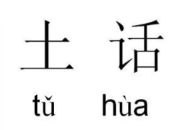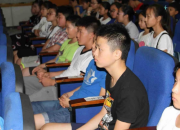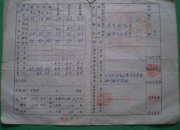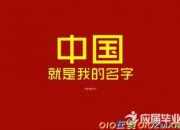高二英语课件(5)
时间:2021-08-31A large reward is offered for the capture of the criminals. 巨额悬赏捉拿这些罪犯。
He got a reward of $900 for catching the criminal 他因抓获罪犯而得900美元酬金
name after=name for 按...命名与(另一人)同名, name after 用的名字命名
John was named after his uncle.
约翰与他叔父同名。The child was named after his father.随父亲起名
This building is named after a famous scientist。这座楼以一位著名科学家命名。
Some parents name their baby after themselves.
technician technical adj. technology technic(具体的)技术 nowhere ad. 1. 任何地方都不
In the winter break I went nowhere, just stayed at home. 寒假期间,我什么地方都没去,一直呆在家里。 The dictionary is nowhere to be found. 那本词典哪儿也找不到。 n.
1. 没有什么地方 He had nowhere to go. 他无处可去。 2. 不知名的地方
We camped out in the middle of nowhere last summer. 去年夏天我们在一处茫茫蛮荒之地露营。 Some of the great men came out of nowhere. 有些伟人来自不知名的小地方。 3. 任何地方
They lived out in the country, miles from nowhere. 他们住在乡下,离任何有人的地方还有好几英里。 4. 乌有;不存在的地方
A tiger appeared from nowhere. 突然地出现了一只老虎。 Altogether ad. 1. 完全,全然
I am altogether on your side in this matter. 在这个问题上我完全支持你。 2. 全部,合计
He bought altogether 500 hectares of land. 他总共买了五百公顷土地。 3. 总之,总而言之
Altogether, exports are looking up. 总的说来,出口贸易在好转。 appearance n. 1. 出现;显露[C]
John's appearance in the doorway was welcomed with shouts. 约翰出现在门口时,大家高喊着欢迎他。 2. 露面;来到;演出[C]
The singer made her first appearance in a concert in Boston. 这位歌唱家第一次演出是在波士顿的一个音乐会上。 She's made a number of television appearances. 她已在电视上好几次亮相。 3. 外貌,外观;外表[U][C]
The appearance of the old house completely changed. 那所旧房子的外观全变了。 output n. 1.产量,产品
The measures will enable us to double our output of bicycles. 这些措施能使我们的自行车产量加倍。
2.输出;输出功率the power output of a transformer变压器的输出功率3.作品artistic output 艺术作品 latter a.
1. 后面的;后半的;末了的
This latter point was of great importance. 后面这点极为重要。 2. (两者中)后者的
Here are Tom and David; the latter is my brother. 这是汤姆和戴维;后者是我的兄弟。 distinguish vt. -ed
1. 区别;识别[(+from)]
He can distinguish a genuine antique from a reproduction. 他能区别真正的古董与复制品。 2. (凭感觉器官)辨认出
I can distinguish my roommates by their footsteps. 我能根据室友的脚步声辨认出他们。 I can distinguish them at a distance. 从远处我能认出他们
vi.
1. 区别;识别;辨别[(+between)]
It is certainly important to distinguish between right and wrong. 明辨是非当然要紧。
Speeches distinguishes man from the animals. 言语使人区别于动物。 in detail 详细地
Would you please explain the theme in detail? 您是否能详细地说明一下主题?
Period V The Object
Teaching Aims:
1.Review what can be used.
2.Review some important rules about the object. Teaching Important Points:
1.Master the v-ing form and the infinitive used as the object. 2.Master the compound object and “it” used as the formal object. Teaching Difficult Point
How to master the differences between the v-ing form and the infinitive used as the object. Teaching Methods:
Review,explanation and inductive methods. Teaching Aids: 1.a computer 2.a courseware Teaching Procedures: Step I Greetings
Greet the whole class as usual Step II Revision
T:Please look at the sentences on the screen.Try to find the object in each sentence. (Show the following on the screen) l.I consider it my duty to help you. 2.She will buy me a birthday present.
3.I found his report interesting. 4.I’m considering changing my job. 5.He decided to go abroad for futher study. 6.She said that she was sick that day.
(Ss prepare for a few minutes and then teacher asks some students to say their answers.) T:Look at the first sentence.Who will try?
Sa:I'll try.In this sentence,“it”is used as the formal object and the infinitve “to help you”is the real object.
T:Good.We know that a v-ing form and clause can also be used as the real object in such a sentence pattern.Do you remember? Ss:Yes.
T:Who can make a sentence using a v-ing form as the real object? Sb:We thought it no good telling him that.
T:Good.Who can make a sentence with a clause as its real object?
Sc:They want to make it clear to the public that they do an important and necessary job. T:Good.Sit down,please.Now,let’s look at the next sentence.Who wants a try?
Sd:In this sentence,。me”is the indirect object and“a birthday present”is the direct object.
T:Right.We know that some verbs can take both a direct obiect and an indirect object,such as:give,lend,bring, fetch.take。pass,send,ask,write,tell, show,teach,make,buy.
(Write the verbs on the Bb.)You should try to remember them after class,0K?) Ss:0K.
T:Now,the third sentence.Li Jing,you try,please.
Se:In this sentence,“his report’’is the object and“interesting”is the object complement.
T:Good.Please sit down.We know that the infinitive and the noun can also be used as the object complement besides the adjective.Who can give us example. Sg:They elected him chairman of the club.
T:Good.Now,1ook at the fourth sentence.Who’d like to have a try? Sh:In this sentence“changing my job”is the object.
T:Right.Can you say some verbs that can only be followed by the v-ing form?
Si:Yes.Consider,delay,admit,enjoy,escape,finish,mind,miss,practise,require,suggest,avoid,keep,advise,and so on.
T:(Write the verbs on the Bb.)Good.Please sit down.Now,please look at the fifth sentence.Zhang Kai,you try, please.











